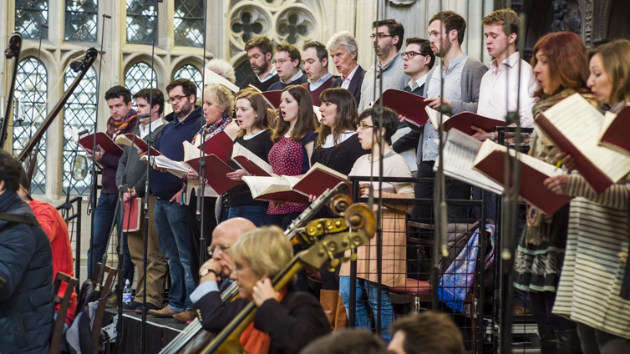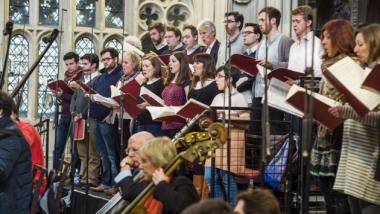
The 1607 ‘favola in musica’ L’Orfeo by Claudio Monteverdi (1567-1643) was not the first opera in music history. That honor goes to Dafne (now lost) from circa 1597 by Jacopo Peri (1561-1633). But Monteverdi did create the earliest surviving opera that is still being performed regularly today, four centuries after its birth.
Last Monday’s wonderfully vibrant, semi-staged concert version at Davies Symphony Hall, conducted by John Eliot Gardiner, demonstrated that Monteverdi’s masterpiece is as relevant and alive as the day it premiered.
The English conductor — who is on an American tour with his early music ensembles, the Monteverdi Choir and the English Baroque Soloists — has been fascinated with Monteverdi since childhood.
In a recent interview with San Francisco Classical Voice, Gardiner calls Monteverdi “a compelling musical figure… [who] is concerned with conveying the whole range of human emotions, from the most elevated to the most basic; …. The first composer… to encapsulate human emotion in such an intense and varied way.”
L’Orfeo is more than a straightforward re-telling of the myth of the ancient Greek hero Orpheus: the legendary musician and poet who could tame wild beasts, sway the hearts of men, and even move rocks and trees to tears with his music.
Monteverdi’s most important dramatic innovation in the then-very new genre of “opera” was the fact that, with librettist Alessandro Striggio (ca. 1573- 1630), he created three-dimensional characters who deal with real conflicts and emotions.
In L’Orfeo, Monteverdi shows us a man, Orpheus, who uses his powers to win happiness and then loses it again, meanwhile providing insight into the protagonist’s psychological make-up, feelings, and motivations.
Emotions run sky-high in L’Orfeo — and incredibly low — and they are lavishly illuminated by Monteverdi’s instrumentation. They range from the deepest, darkest despair to the most ecstatic feelings of eternal love, and Gardiner and his fabulous musicians don’t leave a single emotion unexplored or unexpressed. The drama is larger than life; the soloists suffer, rejoice, dance, love, and mourn; and the choir reflects the dramatic action in its posture as a group. Even without the use of costumes, sets, and props, and within the theatrical limitations of the concert stage at Davies, this Orfeo was also visually a very attractive show.
Even without the use of costumes, sets, and props, and within the theatrical limitations of the concert stage at Davies, this Orfeo was also visually a very attractive show. The orchestra was completely decked out with four chitarrones, two harpsichords, two chamber organs, a regal, a harp, a dulcian, recorders, a full set of strings including viola da gamba, and double bass. The wind players (trumpets, cornetti, and sackbuts) marched on stage when needed, the female choir members were dressed in colorful outfits, and the choir clapped and cheered along with the many festive instrumental ritornellos.
The choir also supplied the soloists, and they were amazing without exception. They often literally stepped out of the choir to join the dramatic action, and all but one of them (countertenor James Hall, who sang Third Shepherd) covered multiple roles.
Monday night’s Orpheus was the stunning English tenor Andrew Tortise, totally believable as someone who can use his music to get himself past the gates and guards of the Underworld and charm Pluto (Italian bass Gianluca Buratto) into releasing his beloved Euridice, sung by Argentinian soprano Mariana Flores. With her sensual, dusky timbre, she was even more impressive in her role as Speranza (Hope).
Italian Soprano Francesca Aspromonte was astonishing as La Musica/Music, the allegorical character who introduces the opera in the Prologue, but she outdid herself vocally and dramatically as Messenger, doubled over with anguish and grief to have to deliver the news of Euridice’s death in Act II. Mezzo-soprano Esther Brazil and soprano Francesca Boncompagni also deserve accolades for their strong showings as Nymph and Proserpina respectively, but there was not a weak voice in the house.
The Monteverdi Choir and the English Baroque Soloists have been leading ensembles in the early music movement ever since Gardiner founded them, in the case of the choir more than 50 years ago, in 1964. But it was Gardiner’s guidance and vision that brought about this major shift in the way modern audiences perceive and appreciate period performances, and Gardiner’s merits cannot be overestimated.
It was an honor and a privilege, but mostly a delight to see him at work.

